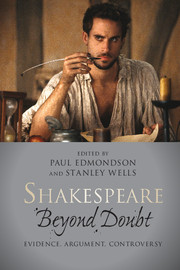Book contents
- Frontmatter
- Content
- List of illustrations
- List of contributors
- General introduction
- Part I Sceptics
- 1 The unreadable Delia Bacon
- 2 The case for Bacon
- 3 The case for Marlowe
- 4 The life and theatrical interests of Edward de Vere, seventeenth Earl of Oxford
- 5 The unusual suspects
- Part II Shakespeare as author
- Part III A cultural phenomenon: Did Shakespeare write Shakespeare?
- Afterword
- A selected reading list
- Notes
- Index
2 - The case for Bacon
from Part I - Sceptics
Published online by Cambridge University Press: 05 April 2013
- Frontmatter
- Content
- List of illustrations
- List of contributors
- General introduction
- Part I Sceptics
- 1 The unreadable Delia Bacon
- 2 The case for Bacon
- 3 The case for Marlowe
- 4 The life and theatrical interests of Edward de Vere, seventeenth Earl of Oxford
- 5 The unusual suspects
- Part II Shakespeare as author
- Part III A cultural phenomenon: Did Shakespeare write Shakespeare?
- Afterword
- A selected reading list
- Notes
- Index
Summary
In June 1853, Thomas Carlyle and his wife Jane Welsh Carlyle hosted a somewhat bizarre tea party at their Chelsea home on Cheyne Walk. The guest of honour was a Connecticut lady referred to Carlyle by Ralph Waldo Emerson, Miss Delia Bacon. On Emerson's suggestion, Carlyle had also invited James Spedding. Spedding and Miss Bacon had something in common – a passionate interest in the life and works of Francis Bacon. Spedding had in 1834 resolved to write a life of Bacon, and subsequently devoted his life to that pursuit. Miss Bacon, by contrast, was devoting her life to claiming that Bacon had written the plays of William Shakespeare.
In the mid-nineteenth century, Francis Bacon was widely regarded as one of Britain's most powerful intellects, a motor of progress and the father of modern science. Alexander Pope had notoriously dubbed him the ‘brightest, wisest, meanest of mankind’, and, although the question of Bacon's ‘meanness’ would continue to incite passionate debate – and lead men like Spedding to spend their lives defending his reputation – few would doubt the epithets of ‘brightest, wisest’. In 1592, Bacon famously declared he had ‘taken all Knowledge, to be my Province’, and his vast range of activities – lawyer, politician, parliamentarian, courtier, essayist, natural philosopher – bore out his claim. In later years, he embarked on a massive master-plan for the reworking of all knowledge, known as the Great Instauration. If Shakespeare's plays had to be attributed to a contemporary with almost superhuman ambition and range, then Bacon naturally led the field.
- Type
- Chapter
- Information
- Shakespeare beyond DoubtEvidence, Argument, Controversy, pp. 16 - 28Publisher: Cambridge University PressPrint publication year: 2013



